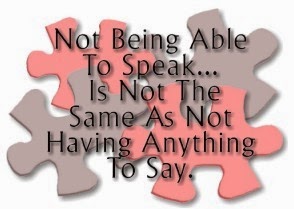As wonderful as that is, it is important to know that in
order to raise an independent adult living with autism, recognize that they
have a right to be heard.
I always tell the story a young chap on the autism spectrum I
worked with a few years ago, who was very aggressive towards me, and showed self-injurious
behaviour. He would bite his wrist often, and he would attack me by jumping on
me and squeezing me with his strong bones (somehow children with autism have
very strong bones and plenty strength). Everybody would ask me if he wanted to
kill me, but I would insist that he had something to say. It turned out that he
was trying to say that he was hungry. By observing the behaviour, we recognized
what he was trying to say. We taught him to ask for food through sign language,
and because he was echolalic, he picked up on saying “I want to eat”. His
behaviour definitely improved, and his speech improved as well.
Another little girl I worked with had always thrown a tantrum
in school, and the teacher had no clue how to stop the behaviour. When I started
working with her in school, I introduced pictures and Makaton sign language to
her, and she picked up the sign language faster than the pictures. One day,
while her teacher drank tea at her desk during break time, this little girl
walked up to her and signed “drink”. What a joy to behold.
Different children respond differently in communication skill
development, but one thing is sure, they all have something to say. They have a
RIGHT TO BE HEARD.
 |
| Temple Grandin quote courtesy pioneeringautism.com |
Being on the autism spectrum can be hard for some people, and
on the parents, but it is our duty as parents and professionals working with
them to empower them by giving them an avenue to be heard. Behaviour they say
is communication, but we cannot always assume what the behaviour is saying. It is
therefore important to start as early as possible to give a voice to our
children on the autism spectrum.
Many parents discourage the use of Augmentative and
Alternative Communication (AAC) for their children who are nonverbal or not yet
verbal, because they are afraid that the child may then not find a need to “talk”
(read about AAC here). But in my experience, I have seen more children develop
speech after starting with AAC, and I have seen the nonverbal children being
empowered because they have been given an opportunity to express themselves.
One communication aid may work for one child, and may not
work for another, but as parents and therapists, we should not give up till we
find what works. I usually advice to try different methods, so I use pictures
and sign language, while definitely encouraging speech. I have also used speech
apps on my phone before, although mostly for encouraging language. I find the
children picking what works for them, and I build on it.
If I did not know when I started my autism journey that
children with autism have something to say, in the last 7 years I have
experienced it.
Having something to say may not just be “I want…”, it might
be I don’t like this, I don’t want to go, I want to go out, the noise here is
too much for me, this dress is disturbing my skin, the crowd is too much for me
to handle, I don’t like my teacher. It could simply be “I love you”, this one
is always a pleasure to hear or to read, or to infer based on the child’s
behaviour. Whatever the child is trying to say, it is important to empower them
as early as we can.
In achieving self-determination and autonomy in individuals
living with autism, remember people on the autism spectrum have a RIGHT TO BE
HEARD.




No comments:
Post a Comment